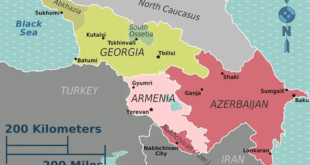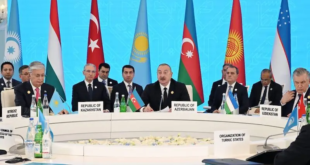 An ex-police officer is accused of war crimes in Chechnya. For some, his case illustrates Moscow’s misguided policy on the republic.
An ex-police officer is accused of war crimes in Chechnya. For some, his case illustrates Moscow’s misguided policy on the republic.
In a war of horrors, it was one of the worst chapters. On the morning of Feb. 5, 2000, more than 100 Russian contract soldiers and riot police entered the village of Novye Aldi in Chechnya, sweeping from house to house in a futile search for separatist rebels.
What followed was what human rights investigators would later describe as “an orgy of killing, arson and rape.”
More than 55 civilians, ranging in age from 1 to 82, were shot, strangled or burned in their homes. Gold teeth were pulled out of the victims’ mouths; televisions, tape recorders and cash were looted; women were gang-raped and slain or left for dead. Yet in more than five years, no soldier was arrested or charged — until recently.
Not until Sergei Babin became one of Russia’s more implausible fugitives.
The 34-year-old former officer with the elite riot police force known as the OMON stands accused of the summary execution of an elderly man during the Novye Aldi mop-up operation. He is also charged with stealing 350 rubles, or about 12 doll., and a pair of jewel-studded earrings from the man’s neighbor.
If he is ever found by authorities, Babin’s arrest and prosecution might mark the first concrete step to atone for one of the worst atrocities of the Chechen war. Yet in a sign of how profoundly troubled the Russian public has become over the long-running conflict, Babin has emerged as a cause celebre for the antiwar movement here in St. Petersburg, a symbol of what can go wrong when the nation sends its sons to fight an unpopular war.
On May 30, several dozen protesters from the city’s liberal, leftist and pro-democracy organizations, including the ultra-leftist National Bolshevik Party, the liberal Yabloko youth movement and the pro-democracy organization Our Choice, rallied outside the St. Petersburg branch headquarters of the OMON. The picketers demanded that Babin be tried in St. Petersburg rather than Chechnya, and called him a victim of Russian President Vladimir V. Putin’s failed policy in the northern Caucasus separatist republic.
“Babin is a Hostage of Putin,” said some of the signs. “Stop the War in Chechnya!” said others.
How did young liberal activists come to be marching in the streets on behalf of a riot policeman accused of war crimes?
Despite more than a decade of on-and-off fighting in Chechnya and a guerrilla insurgency that continues to claim the lives of a dozen or more Russian servicemen a month, this nation has experienced no substantial antiwar movement. Facing frequent acts of Chechen-organized terrorism, most Russians have been either silent or quietly supportive of the government’s attempts to suppress the separatists and shore up the Moscow- friendly Chechen government in the republic’s capital, Grozny.
Yet Moscow’s inability to end the hostilities and the continued need to send Russian troops and police officers into the hazardous republic has quietly inspired growing antagonism toward the war. A poll in May by the respected Yuri Levada center shows that 77% of the public worries that Putin will not be able to end the war, and 62% favor peace negotiations with Chechen rebels, a policy Putin has steadfastly refused to adopt.
The incident in Novye Aldi, outside Grozny, is one of the most thoroughly investigated of the Chechen war, and Moscow has been under intense pressure from human rights advocates at home and elsewhere in Europe to bring the perpetrators to justice.
But here in St. Petersburg, Babin supporters say they believe the assertion of the former riot policeman and his superior officers that he was in a village about 60 miles from Novye Aldi on the day of the operation. They also support the former officer’s decision to go into hiding, based on his fears that he would be slain if he were transferred to a Chechen prison.
“I was a police officer. And now I am a fugitive. Now I know what it’s like on both sides,” Babin said in an interview last month, arranged at a location that was not disclosed in advance.
“The situation now is that nobody wants to go to Chechnya anymore. Our record number of soldiers [in the OMON’s St. Petersburg unit] is 1,200 officers, but St. Petersburg is short of 500 personnel now. There’s a huge leak of people, mostly because they are refusing to go to Chechnya….The situation is very troubled, and I don’t know what’s going to happen,” he said.
Babin was part of an engineering squad sent to dismantle explosives and had served seven tours of duty in Chechnya.
On that day in 2000, as Russian forces were in the midst of a long-running battle for Grozny and the surrounding countryside, Babin says, he was working at a checkpoint in the village of Betti-Mokhk.
He returned to St. Petersburg later in the year and took early retirement from the OMON in 2003, only to be arrested last December, based on the statement of a Novye Aldi resident who said she recognized Babin’s face from a photograph.
He was released on his own recognizance and went into hiding. He has not seen his 8-year-old daughter in six months.
“Usually at mass rallies, we and the OMON are standing on opposite sides of the barriers,” said Andrei Dmitriyev, a leader of the National Bolshevik Party in St. Petersburg. “They’re dispersing us, sometimes beating us. But at the same time, they themselves sometimes fall victim to the state we have now. They suffer from the authorities who are using them as cannon fodder in Chechnya.
“It was an opportunity for us to demonstrate to the OMON how cynically they are being used, and what kind of authorities they are protecting,” said Dmitriyev, who was among the protesters May 30.
Alexander Shurshev, head of the local Yabloko youth group, said the idea of the protest was hatched by a local lawmaker, Sergei Gulyaev, who has tried to mobilize support for Babin.
“I must say, when the issue of the protest was first discussed, this action produced a lot of debate. Some people refused to touch this issue,” Shurshev said. “But my justification was it’s not up to me to decide whether he’s guilty or not. I just don’t want a possibly innocent person to be tried in Chechnya.”
Gulyaev said Babin was chosen as a scapegoat because he had retired from the service in the midst of a work-related inquiry not tied to Novye Aldi.
“Babin from the beginning has explained this as some kind of confusion or mistake, but if he submits himself, he fears he will be taken to the Chechen border and killed,” Gulyaev said. “They will say he tried to run away. And if he even makes it to a Chechen prison, they simply will kill him there.”
Chechnya’s prosecutor, Vladimir Kravchenko, said in an interview that he would guarantee Babin’s safety.
“Sergei Babin is suspected of a number of very serious crimes. Murder is one of them, and there is no statute of limitations for that. Does he really want to spend the rest of his life in hiding, especially if he says he is innocent? This is a very odd position for a policeman,” he said.
“Frankly speaking, his refusal to cooperate with the investigation raises new questions, and makes us even more suspicious.”
Russian human rights organizations have refused to join in Babin’s defense.
“The action taken by St. Petersburg Yabloko, National Bolsheviks and some other organizations demonstrates how contradictory, shortsighted and confused their position really is,” said Alexander Cherkasov, an activist with the Memorial human rights organization who specializes in Chechnya.
“On the one hand they say that they are against the war in Chechnya; on the other hand, they rally to prevent the investigation of a serious crime committed by law enforcement servicemen in Chechnya,” he said.
Cherkasov said he believed that Babin’s former superiors were supporting him because they feared he could identify those among the St. Petersburg unit’s officers who were deployed in the village that day.
“I am confident that among themselves the OMON officers know who committed those crimes, but they don’t want to say the truth about their comrades in arms,” Cherkasov said.
The commander of the OMON in St. Petersburg, Col. Viktor Kabatsky, said he was doing everything possible to assist in Babin’s defense.
“He’s a good guy. A reliable, honest, hard-working OMON officer. And when the crime we are talking about happened, he was not anywhere near the site of it,” he said. “I can vouch for him on that as his commander, who was there with him.”
Gulyaev said the government had much more at stake than Babin’s case. If Babin is sent to Chechnya, he said, it will be a crippling morale blow to other OMON officers who face potential deployment in the republic.
“If Sergei is handed over to the Chechens, very few police officers will ever go to Chechnya, either to serve the country or to serve Putin,” he said.
“I’d rather that Chechnya just live separately,” Babin said. “If the troops are withdrawn, this will be much better for everyone.”
 Eurasia Press & News
Eurasia Press & News



